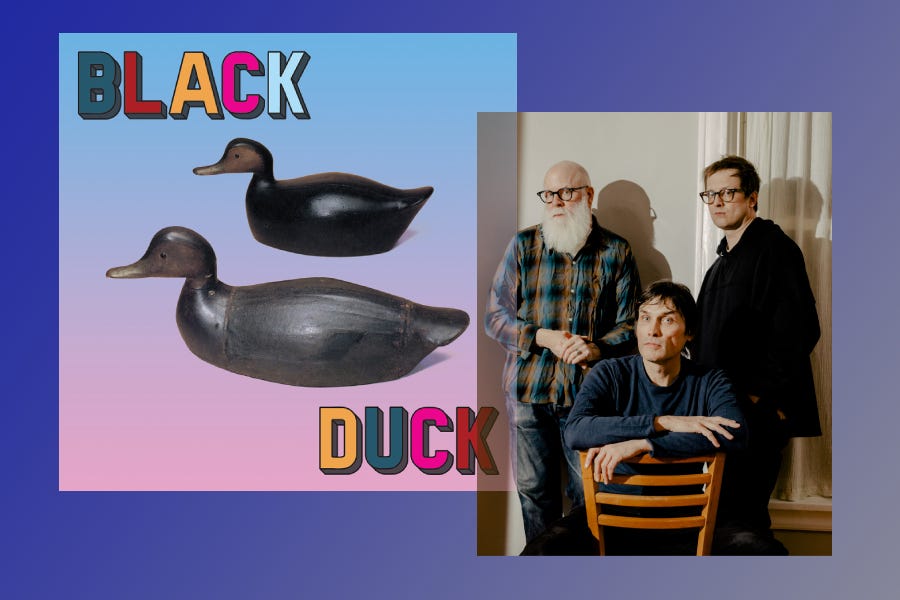Lemon Treasure
Thoughts on the debut album from Chicago supergroup Black Duck and a book about eating hot dogs.
Between the clouds of wildfire smoke wafting down from Canada and torrential downpours that coincided with a gigantic street race and Fourth of July fireworks, the past few weeks in Chicago have been weird, hazy ones. When so much of the world seems out of the ordinary, it’s nice to be able to find a momentary escape by way of a great record — and this edition of Attenuator is devoted to one of my favorite releases of the year, thus far.
I’ll be sharing some of more of my favorite records of 2023 (ones that I haven’t written about yet) in next week’s newsletter, so hit the subscribe button below if that piques your interest.
Birds of a Feather
I’ll be the latest person to admit that “supergroup” is a loaded term, bestowing some sort of heightened, quasi-mythical status on a collection of known-quantity musicians who decide to form a band together. But there’s some utility to the word, even if it’s a overused and largely up to personal interpretation. With that in mind, there’s no way The Traveling Wilburys was a mere side project for George Harrison, Bob Dylan, Tom Petty, Roy Orbison, and Jeff Lynne — that’s a bonafide supergroup. Ditto with Golden Smog, composed of ‘90s alt-country players who weren’t quite household names like the Wilburys, but achieve supergroup status by virtue of being conglomerate of leaders in their twangy, left-of-the-dial field.
I’m comfortable referring to Black Duck as a supergroup, if only because the folks in the band individually feel like prominent parts of the jazz-adjacent, experimental instrumental rock corner of the Chicago music scene that I tend to gravitate to. Made up of Doug McCombs (Tortoise, Brokeback), Bill MacKay (Ryley Walker, BCMC), and Charles Rumback (Colorlist, Fred Lonberg-Holm’s Lightbox Orchestra), Black Duck began as a purely improvisational project, spontaneously shaping tracks onstage — I think I first encountered the trio opening for Stereolab at Thalia Hall back in 2019.
Black Duck released its self-titled debut at the end of June, and it does exactly what a great supergroup album should do, blending nods to each member’s previous output with the musical alchemy of a group feeling out its distinctive interplay and voice. According to a press release, the trio began the process of crafting the album by having each member write a track. The lonesome riffs of McComb’s contribution “Of the Lit Backyards” would be at home on a Brokeback record, while MacKay’s “Delivery” channels the rough, more avant-garde moments of his 2019 solo album Fountain Fire.
Those tunes (“Delivery” in particular) are fun and gratifying listens for long-time fans of the musicians involved, but it’s the five other improvised tracks present on Black Duck that unlock the group’s potential. Of course, there’s lots of good rhythmic droning on this record (“Second Guess” and “Thunder Fade That Earth Smell” are my favorites), providing the kind of loose structure that invites plenty of opportunities for interesting melodies and percussion flourishes to briefly take shape. The steady, distortion-ridden krautrock strum of “Lemon Treasure” proves that two guitarists and a drummer don’t have to sacrifice any throbbing low-end, building to one of the LP’s most triumphant crescendos. The closing number “Light’s New Measure” is an instrumental ballad of sorts, transitioning from sparse, sentimental chords to an intricate collage of finger-picked melodies and brushed snare.
Seeing Black Duck perform at Hungry Brain (after a really spectacular modular synth set from Sam Prekop) during the trio’s recent record release show only confirmed the level to which McCombs, MacKay, and Rumback have locked into an unpredictable groove. There were moments during the set that didn’t sound anything like the music contained on the group’s album, suggesting that this supergroup has room to evolve alongside the various other projects that these players are part of.
I’m hopeful that Black Duck won’t end up a one-and-done project, mostly due to the prevalence of long-running supergroups in the tight-knit and collaborative-to-a-fault Chicago music scene. From Loose Fur (Wilco’s Jeff Tweedy and Glenn Kotche, plus producer and musician Jim O’Rourke) to avant-garde jazz outfit the Art Ensemble of Chicago (a constantly-shifting lineup, anchored by Roscoe Mitchell and Famoudou Don Moye), there’s a tradition of groups of prominent musicians who coalesced in Chicago finding the time to continue their collaboration (please prove me right by releasing your third album, Loose Fur). Whether it’s another studio album or more performances exploring their mercurial sound, I’m looking forward to hearing what McCombs, MacKay, and Rumback have in store while collaborating in their supergroup configuration.
If you happen to be in Chicago, Black Duck is throwing a pizza party + DJ night at Middle Brow Bungalow in Logan Square on Wednesday, July 12 from 6-10pm.
Book Nook: Raw Dog by Jamie Loftus
It’s kind of surprising that it took this long for a hot dog road trip book to come into existence, but I’m glad that Jamie Loftus was the one to pluck it out of the ketchup-y ether. Not content to write an inoffensive, sanitized travelogue, Loftus doesn’t shy away from exposing how the sausage is made, finding ways to honestly and humorously consider the hot dog’s intrinsic ties to industrialized meat production, worker exploitation, and timeless capitalist greed. She also explains (sometimes in graphic detail) what it’s like to eat as many as five different regional wieners throughout the course of a single day.
Documenting a journey across the US during the sorta-like-things-were-pre-COVID-but-not-really summer of 2021, Raw Dog balances Loftus’s love of hot dogs with her desire to unravel the myths and sordid details surrounding them. There’s a brutally candid chapter about how hot dogs are actually made, multiple passages recounting the intrafamily conflicts and grease fires that plague hot dog stands, and plenty of unvarnished descriptions of the encased meats and accompanying toppings that Loftus consumes. Yes, southern chili is “goop” and — though writing this may get my Chicagoan card revoked — I can understand why Loftus might view my city’s delicious dragged-through-the-garden dogs as “too much.”
Even if you’re not interested in the subtle variations in regional hot dog preparations, Raw Dog provides explorations of bizarre wiener-adjacent topics that are inherently fascinating. A chapter on the twisted machinations of the Nathan's Hot Dog Eating Contest feels like it could be expanded into an entire book, while a look at the lives of the recent college grads who drive Oscar Mayer’s fleet of Wienermobiles confirms Loftus’s suspicion that there’s room for intimacy in the gigantic rolling sausage (Slate published a hilarious excerpt of the latter chapter).
Though it’s framed within the tale of a deteriorating relationship, a family medical emergency, and the economic reverberations of the Great Resignation, Raw Dog is a relatively breezy read that leaves you with a lot to think about — you might finish this book during a day on the beach, and you’ll probably end up craving a hot dog, but you may also ask yourself whether you should eat one. The sheer amount of research and intestinal discomfort that went into Raw Dog is evident, but I’m most impressed by how dead set Loftus is on providing a warts-and-all examination of a food that she genuinely enjoys — it’s refreshingly frank in all the right ways.
A Fistful of Links
I got a kick out of reading these recollections of life as a young adult in the pre-smartphone world of the early aughts, as recounted by Dan Kois for Slate. I was a teenager at the time, but I remember calling movie theaters, movie rentals, and arranging time-and-place meetings fondly.
I had no idea that Chicago club Smartbar took its name from a line in A Confederacy Of Dunces until I read Steve Hoffman’s venue retrospective on Resident Advisor. Looking back on 40 years of shows, resident DJs, and dance floor configurations, Hoffman’s piece offers a concise but enlightening portrait of a world-renowned club, accompanied by some amazing vintage fliers.
All too often, we get exposés detailing the behind-the-scenes decisions and fiascos that resulted in mediocre art. But Vulture senior reporter Chris Lee’s conversations with some of the animators behind Spider-Man: Across the Spider-Verse detail the suboptimal working conditions and mercurial vision that underpinned a pretty good movie. The biggest takeaway? Don’t expect another animated Spidey outing nine months from now — at least not with an indecisive producer calling the shots.
This short Semafor round-up of stories about the economic impacts of Taylor Swift’s Eras Tour kinda made my jaw drop. Jenna Moon cites a recent Fortune article claiming that Swift’s decision to tour in Australia (and the international spending on tickets, lodging, etc.) could stave off a recession. What’s more, her tour could generate as much as $5 billion in spending in the America, according to a Guardian article. Maybe all we need to shake off the perpetually-imminent US recession is… more pop super-star stadium tours?
Avant-garde jazz isn’t for everyone, but if you’re trying to dip your toes (and ears?) into the genre, this New York Times list is a good place to start. Marcus J. Moore collected recommendations from a variety of musicians and writers, including chamber-pop composer Julia Holter and producer/DJ Carlos Niño. You’ll have to spend more than five minutes with most of the recommended tracks (contrary to the article’s title), but tunes by the likes of Sonny Sharrock, Jeff Parker, and Ornette Coleman are well-worth your listening time.
Thanks for waddling through my newsletter. If you know someone who enjoys bands named after waterfowl or books about sausages that are sometimes prepared in foul water, please share it with them by hitting the button below. I’ll be back in your inbox soon!







